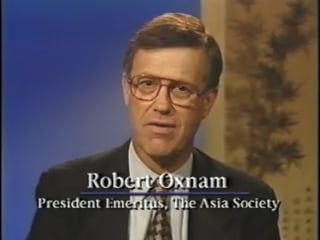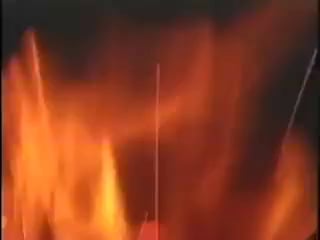Playlist: Wang Can (177-217 Ce): Wang Can and the Poetry of Scholar-Officials During the Han
Introduction
Transcript
Robert Oxnam: The Han dynasty developed a government bureaucracy staffed by ministers educated to follow the Confucian precept of service to the state. Toward the end of the Han rule, some members of this governing elite emerged as a new generation of lyric poets, following in the tradition of the Book of Songs.
Stephen Owen: One thing that changes when that tradition is picked up again at the end of the second century and the beginning of the third century is that the poets not only talk about history, become witnesses of history, they also are people who themselves are known, whose biographies are known, who are themselves figures in history. And so, when they write, we see not only their comments on ... their representation of history, we see their own personalities.
Wang Can: Poet at the Fall of the Han
Wang Can (177-217 CE) lived during the end of the Han dynasty and, as a bureaucrat in the Han government, was forced to flee to southern China from the capital city of Chang-an (today's Xian, or Sian) in order to escape the rebellious factions that were challenging Han rule. The Han dynasty fell in 220 CE.
Transcript
Robert Oxnam: One of the most famous poets of this generation is Wang Can, who was born at the end of the second century and lived just at the time when the Han dynasty was crumbling. It was a period of famine and rebellions in many parts of the empire.
Paul Rouzer: Basically, the Chinese empire was in chaos. Wang Can himself during this time period was forced to flee the capital of China at this time, the city of Chang-an, which was located near the present day city of Xian, in North Central China.
He had to flee the city because he was a bureaucrat of the empire, and if he was caught in the city when rebels took the city, he would probably have been executed. He was forced to leave his entire family behind and flee to far southern China, an area that at that time was still occupied by large numbers of non-Chinese people.
Robert Oxnam: Wang Can uses his poetry to express his great remorse that he cannot fulfill his Confucian responsibility to family and state.
“A Song of Seven Sorrows”
Transcript
"A Song of Seven Sorrows," by Wang CanThe Western City thrown into all this disorder,
jackals and tigers come to plot its ruin.
Again I abandon the capital and depart.
Consign myself to the barbarians of the South.
My close kin all face me in sorrow,
dearest friends follow and cling to my robes.
As I leave the city gates, I see nothing before me,
save white bones covering the level fields.
On the road, a starving woman
who hugs her child then abandons him in the weeds.
She turns to hear his screams and howls,
then wipes her tears and goes on alone —
saying "I hardly know where I shall die!
How can I look after both of us?"
I drive on my horse, abandon her and depart,
for I cannot bear to hear her words.
Southward I climb the Tomb of Pa,
turn my head, look to the city.
I know now how the poet of "Falling Stream"
moaned and felt his heart break within!
Stephen Owen: He abandons the city. This beautiful thing of leaving his family, his family clinging to him, and going out and seeing bones.
And the bones, of course, refer to or signify that family had not buried these people. Family has abandoned the dead.
And then on the way, he sees the mother abandoning her child; and the child will, of course, become the bones next week. And saying, "I don't know where I will die, how can I keep you alive."
And the poet says, "I couldn't bear to see this," and he abandoned them.
And this strange interplay between his abandoning his family, the bones as evidence of others abandoning the dead, the mother abandoning this child, him abandoning the mother and the child, and then climbing the tomb mound of Emperor Wan, the Emperor Wan represented the height of Han government. This was when everything worked.
Paul Rouzer: Finally, and perhaps most important of all, Wang Can relates his own feelings to a poet who had composed a poem from the Book of Songs, the so-called "Falling Spring" poem, in which a poet compares his own emotional response to the fall of the Zhou dynasty capital to the actions of a spring, of a falling spring descending over the rocks with its cold water. Wang Can relates to this early poet, this early poet of a Book of Songs poem, and communicates his own feelings back through time to him, creates a bond between this early Book of Songs poet and himself.
About the Speakers
Robert B. Oxnam
President Emeritus, Asia Society
Stephen Owen
James Bryant Conant University Professor; Professor of Comparative Literature, Harvard University
Paul Rouzer
Associate Professor, Department of Asian Languages and Literatures, University of Minnesota
Marsha Wagner
Adjunct Professor of Chinese Literature, Columbia University
David D. W. Wang
Edward C. Henderson Professor of Chinese Literature, Harvard University
Related Videos
The Book of Songs and China’s Literary Tradition
The Poetry of Retreat at the Fall of the Han
Tao Qian and the Tradition of Retreat
Prelude to Tang Poetry: Poetry of the Zhou and Han






